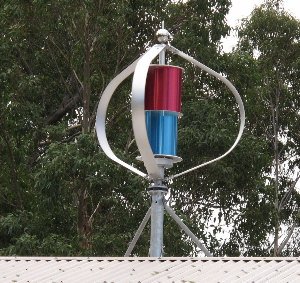Alternative Energy and the Weather
The prospect of a changing climate and the need for finding less polluting energy sources, was brought home today when a visit to a local house was made to investigate a newly installed power generator, harvesting energy from the wind. Followers of this site will know that the weather has been a strong focus from its outset. Likewise it is hoped that there is also a strong environmental theme that we need to understand our environment to look after it.
Many houses in Lake Tyers Beach have photo voltaic silicon cells on the roof and these not only supplement their own use of electricity but often make more than they need and can sell it back onto the grid. These cells are tough and low maintenance and certainly point in the right direction environmentally. Houses can reduce their carbon footprints dramatically with this technology. Viewing the houses of Lake Tyers Beach from the channel markers on the lake reveals row upon row of solar panels. Well done guys, early adopters!!
This is a 8 panel system with up to 1500 Watts Solar electro voltaic system. The owner of this house was delighted with his installation, as he could see his old fashioned spinning wheel based meter going backwards when he was generating excess electricity!!! Nice one eh? Smart Meters put an end to that amusement. |
 This is a combination of a Savorious and Darrious wind turbines that generates up to 2000Watts of power. This turbine was spinning easily even though in a relatively sheltered position and light winds. It looked impressive!! |
Both of these systems are used to supplement electricity use in the house. Both also have inverters that allow excess electricity to be sold back to the grid. Other systems such as Solar Hot Water systems set out to avoid the use of electricity and simply tap into the energy in the form of heat directly. Likewise well designed houses with good verandas and eaves can also reduce the need for energy as well.
These systems have computers that allow the tanks to be lower than the panels, and the tiny computer senses when the solar panels are hotter than the water in the tank, and that there is valuable energy available. The computer starts up a low power pump (5Watts) and pushes the cooler water from the tank, up into the panels, and forces the heated water in the panels down into the tank. When the hot water tank has sufficient hot water at the required temperature (often much hotter than a person normally afford to heat it electrically) the pump switches off.
So what does this have to do with the weather? Well obviously how much cloud cover, hours of illumination and ambient temperatures all effect the home generation systems and also our demand for power. The draw back for solar is that we tend to have our highest demand for power in winter when our hours of illumination are lowest and days of cloud cover are highest. The wind generators would seem to be able to fill a hole here and could potentially augment our electricity supplies all the year around, and 24/7 at that. We could come to love those darn Easterlies. However observers of this site's wind charts will realise though, that wind can also be a fickle friend, with usually a land/sea initiated breeze coming from somewhere, either onshore or offshore. Usually in the change over, the wind drops to very low speed and a wind turbine would grind to a halt.
It is interesting and very encouraging to see that these technologies are becoming realities for the average house owner to acquire and reduce their electricity bills and carbon foot print. The vested interests in power generation and therefore control of power to the consumer will not take this lightly as it directly eats into their profits. However until they meet the high environmental standards that the systems on our homes meet then they have a long way to go to be able to claim to be a superior system in every way. No doubt they find it irritating that their system is becoming less and less important to many people, although obviously still essential, as mentioned above, access to a reliable supply of power is still required when the alternative sources are not available. Power companies should be the first and biggest sellers of this technology, not resent it, otherwise they will go the way of Kodak not recognising the potential of the digital camera (yet they made one of the very first such devices!!!)
Some people were lucky to get onto a 66cent per kilowatt tariff for feeding power back into the grid. People who sign up now, get much less. However what it is inescapable, and impossible to legislate against, is the fact that as the costs of power rise, any kilowatt saved will always exactly equal what it would have cost to buy it!!! So investing in solar now is really investing in a power-full future.
Ref: http://savonius.hostinazo.com/wp-content/uploads/Gupta.pdf


